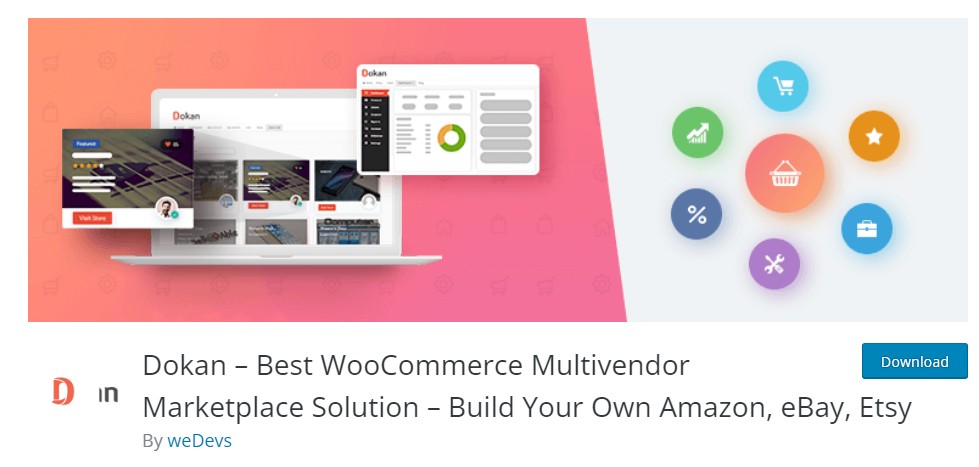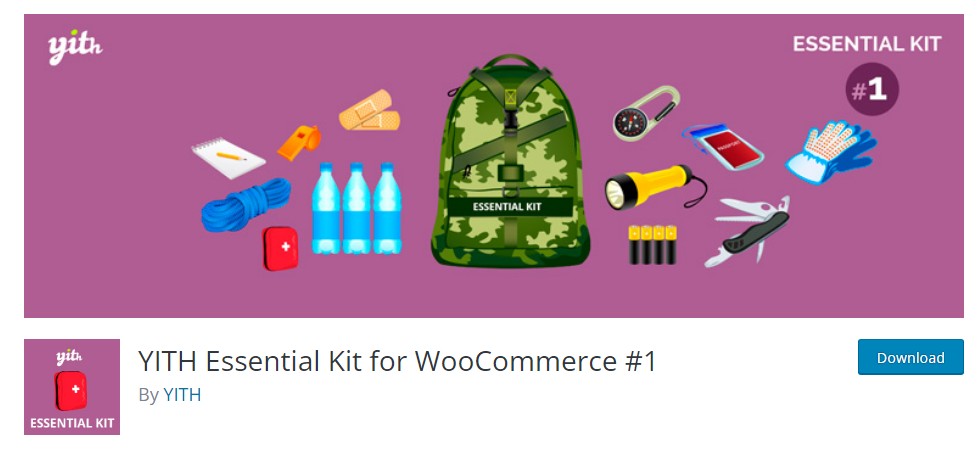In this article, I am going to tell you 15+ Best Multi Vendor Marketplace. so if you want to know about it, then keep reading this article. Because I am going to give you complete information about it, so let’s start.
When done well, marketplaces, or multi-vendor internet stores, are gold mines. Etsy and eBay are the ruling ones, but you can also find well-known specialty multi-vendor websites. The purpose of multi-vendor websites is to make it possible for individuals or businesses to set up profiles and list their goods for sale.
Customers can choose between Web Designer and Company XYZ when they visit your multi-vendor site, and everything is handled through the same shopping cart. The method for processing payments from multiple suppliers divides the money between the two vendors, and everyone is satisfied. With so many people producing and selling in one location, the buyer may find a wider variety of goods, and you, the website owner, can earn a sizable sum of money through charges.

However, several of the most well-known e-commerce systems, including Squarespace and Shopify, are unable to give you access to multi-vendor interfaces. It is now time for us to compile the most comprehensive list of multi-vendor online stores so that you can build a lovely community and possibly earn a lot of money. Let’s look at it.
Today’s article focuses on the same,i.e, “15+ Best Multi Vendor Marketplace”. The articles entail each bit of information necessary for you to know.
Let’s get started!
Table of Contents
What Is a Multi Vendor Marketplace?
A multi-vendor eCommerce platform allows several sellers to display and sell their products on one online marketplace. The multi-vendor e-commerce platform offers all fundamental e-commerce capabilities and critical connections to simplify/manage marketplace operations. A multi-vendor eCommerce platform helps businesses save a significant amount of time on web development, which can then be used to promote and market your online market.
So what does a multi-vendor marketplace platform actually entail? Consider an online store that showcases a vendor’s products and a shopping cart for those things. A large-scale online store called a multi vendor marketplace allows several merchants to offer their goods and services.
What therefore distinguishes a solid multi vendor marketplace platform or an eCommerce marketplace platform? You may search for these multi vendor platform plugins and extensions more quickly with my assistance. Before we get started, consider these questions when choosing a framework for your multi-vendor store.
- Is registering simple?
- Does it have a flexible search to adapt to how people shop today?
- Is adding reviews an easy, quick, and cross-platform process?
- Is setting up a payment system simple?
- What percentage of the platform’s functionalities genuinely meet your needs?
You should first focus on the platform while choosing an e-commerce platform. I’ll give a quick overview of each of the following multi-vendor e-commerce platforms.
15+ Best Multi Vendor Marketplace!
An excellent technique to control every area of the website is to use a multi vendor marketplace. You don’t need to involve your developer in every little change or handle items, vendors, and commissions separately from the dashboard. Let’s now look more closely at the top multi-vendor e-commerce platforms:
1. Dokan WooCommerce Plugin

Dokan is a well-liked multi-vendor WooCommerce plugin that is optimized and prepared to open your eCommerce website. It has features like a product panel and a front end. The additional benefit of having a vendor rating review system that resembles eBay’s design is also yours. Boost your online store, stay safe, and keep it always available.
Pricing Plans:
- Basic: Free
- Starter: $149/Year
- Professional: $249/Year
- Business: $499/Year
- Enterprise: $999/Year
2. Mayosis WordPress Marketplace
This is an excellent place to start if you want to sell things like artwork, templates, music, ebooks, stock photos and videos, themes, plugins, codes, or software. The Mayosis WordPress marketplace enables you to edit, arrange, and sell goods and services that are in line with your company’s objectives.
Pricing Plan:
- Free Trial
- Regular Plan: $67/Year
- Extended Plan: $1990/Year
3. Yith WooCommerce Multi Vendor Extension

With the help of the YITH WooCommerce multi vendor extension, you may choose a registered user to run an online store. In accordance with the admin-set permissions, vendors can then sell their own goods and update their product inventories. Both WordPress 5.3 and WooCommerce 3.8 are compliant with the addon. Additionally, your vendors can add multilingual online stores. This includes Dutch, English, Italian, and Spanish.
Pricing Plans:
- Single site: $99.99/Year
- 6-site license: $299.99/Year
4. Bagisto Multi Vendor Marketplace – Webkul
Several markets with multiple vendors use Laravel as their power source, like Bagisto. A Bagisto store becomes a market as a result. Your suppliers can now generate, manage, and keep track of their goods and transactions via a specialized dashboard. As the admin, you set up both universal and local seller fees if required.
Pricing Plans:
- $349/Year
5. Magento 2 Multi-vendor Marketplace –CedCommerce
CedCommerce’s Magento 2 multi-vendor marketplace solution is a good option for businesses that want to establish a multi-vendor online marketplace. This would make it possible for vendors to come together on a single platform to promote their goods, display their profiles, handle orders via a separate vendor dashboard, and monitor sales figures.
In order to turn your Magento e-commerce website into a functional and functionality multi vendor store similar to Amazon and eBay, you may use the multi Vendor marketplace solution for Magento, which offers a wide range of capabilities. Vendors using Magento 2 stores can build a website that is customized to their own company needs with the aid of different Magento multi vendor plugins.
- Pricing: $299 – $1600
6. Magento 2 Marketplace Extension – LandofCoder
The Magento marketplace extension makes it easier to transform online shops into fully functional marketplaces with many vendors. When using the marketplace extension, you don’t need to bother about modernizing your Magento web app because it is compliant with Magento 2.0 to 2.3.
Your earnings could suffer greatly from a Magento multi-vendor marketplace that is unstable and slow to operate. Magento cloud hosting is available from Cloudways, and it is optimized to provide the greatest performance.
Pricing Plans:
- Single License: $299
- Standard License: +$249
- Premium License: +$899
- Agency License: +$2999
7. Marketplace Multi Vendor Module for Magento 2 – Webkul
Your existing Magento 2 e-commerce store may be transformed into a full-featured online shopping mall with this Marketplace extension with many vendors. This marketplace lets you add many vendors and give them control over things like stock, deliveries, and much more. Each vendor can add various goods that can be delivered by FedEx, USPS, DHL, PayPal, Stripe, and Aramex. Since this marketplace extension is adaptive, you can easily visit your online store on any computing device.
Pricing Plans:
- $349/Year
8. Multiple Vendors Extension – Magenest
Popular Magento 2 Multi Vendor eCommerce extension Multiple Vendors Extension has a plethora of features. You can control merchants and their purchases, impose charges, and even create a conversation zone where sellers can inquire your concerns about the marketplace with this plugin.
Pricing Plan:
- $249/Year
9. Multi Vendor Marketplace Module – CMSMart
AbChoose the Multi Vendor Module For Magento 2 from Cmsmart if you wish to handle your marketplace merchants with ease. You’ll have access to a user-friendly admin interface that will let you automatically authorize orders, and items, and even enable vendors to up-sell. Based on the different categories of merchants, you can create specific transaction fees.
Pricing Plans:
- From $799
10. Growcer Multi Vendor Grocery Marketplace
Growcer is a multi-vendor food marketplace system that enables individuals, small and medium-sized businesses, and major corporations to launch hyperlocal multi-vendor supermarket businesses anywhere in the world. According to your “Order to Cash” process, it can be modified. The administration, suppliers, purchasers, and delivery personnel modules all have characteristics that are focused on the market and technology. The system also incorporates buyer and delivery personnel apps for smooth ordering and delivery.
Pricing Plans:
- One-Time Fee: $4999
11. Advanced Multi Vendor Marketplace Module – Webkul
Advance Multi Vendor Marketplace Module assists in streamlining the supplier enrollment process so that your developer does not need to continually create the application. Based on this module’s capabilities, you can apply custom CSS to the page to make it more individualized and transform it into a variety of languages. In addition to having the ability to enable and stop a particular vendor’s commission, managing many suppliers simultaneously becomes simpler.
Pricing Plans:
- $118.45/Year
12. Multi Vendor Marketplace Module – Knowband
With the Knowband Multi Vendor Module, you can make it easier for customers to create seller profiles, enhance privacy, establish shipping processes, and implement straightforward return policies. Additionally, users can publish reviews of particular products to assist vendors in getting referrals. The best feature of this module is that users of your marketplace may view all of your merchants’ products in one location.
Pricing Plan:
- $118.45/Year
13. Marketplace Pro Module – FME Modules
Marketplace Pro Module is a fantastic tool to employ if you want a robust dashboard to visually track earnings. Additionally, you can define a holding period for transactions, a margin requirement amount for sellers, and even a percentage seller charges for purchases.
Pricing Plan:
- $71.8/Year
14. Yo!Kart Multi Vendor Marketplace Platform
Yo!Kart is a multi-vendor platform specifically designed for creating online marketplaces for commerce. A variety of built-in features, including a product catalog, different vendor storefronts, multi-lingual support, abandoned cart retrieval, etc., are included in this license-based turnkey solution. Yo!Kart provides unmatched UI/UX design to guarantee a seamless consumer experience. The platform can be fully customized to meet the requirements of the company.
Pricing Plan:
- GoQuick: $999 (lifetime ownership)
- GoCustom: $6,999 (lifetime ownership)
15. CS-Cart Multi Vendor
The CS-Cart Multi Vendor software platform marketplace builder enables customers to create multi-seller online marketplaces that are similar to Etsy and Amazon. More than 1,300 malls utilize it all across the world, and Capterra gives it a perfect score. Additionally, the business provides a 15-day free trial.
Pricing plan:
- Multi-vendor: $1,450
- Multi-vendor Plus: $3,500
- Multi-vendor Ultimate: $7,500
How to Select the Best Multi Vendor Marketplace?
Most likely, you’re trying to decide which marketplace platform to use. Choosing a platform might be challenging because there are so many options. We’ve included various platforms along with their individual features.
When it comes to WordPress, bloggers adore its platform’s user interface. There are many WordPress themes, plugins, and extensions to select from, and the learning curve is low. Additionally, WordPress is strongly accepted by all the top hosting companies.
This platform is quickly gaining popularity among business owners in the e-commerce market. The platform’s straightforward inventory management makes it suitable for stores with a large number of SKUs. Magento is also a fan favorite because of its safe online marketplaces and simple connectivity with top hosting providers.
While many web applications, including Magento and WordPress, are developed using the PHP scripting language. Custom PHP scripts are a terrific option to consider if you want a website that is more uniquely designed. While keeping control of the web app, you can integrate a wide range of external services.
PrestaShop was created for eCommerce stores with significant traffic, much like Magento. Due to its lighter weight than Magento, it uses fewer server resources. This platform’s extensions are simple to install and continue to be configurable.
FAQs
A recent study by DigitalCommerce360 found that the biggest online marketplaces (including Alibaba, Amazon, eBay, and many others) will produce $2.67 trillion in revenue, or almost 62% of all internet sales worldwide.
Due to their extensive product selection, immediate accessibility to a broad audience (for sellers), and greater prospects for business owner growth and revenue production, e-commerce marketplaces have always been more successful. For entrepreneurs and businesses aiming for significant growth, it is a profitable business model.
Finding a trusted multi-vendor marketplace platform that meets your business needs is the first step in building your multi-vendor website swiftly. A ready-to-launch online marketplace is delivered by multi-vendor eCommerce solutions, which is more time and money efficient.
To simplify store operations, a multivendor eCommerce business needs hundreds of critical features and connectors. These attributes differ amongst users of the marketplace (admin, seller, and buyer). A marketplace owner or administrator, for instance, needs capabilities like a product catalog, inventory control, abandoned cart recovery, various payment methods, and more.
Similar services for sellers include import/export, discount and coupon production, shipping profile management, sales reports, and shop inventory. Finally, the multi-vendor e-commerce platform needs to offer sophisticated features to customers, such as Online payments, different languages support, Receipts, and much more.
According to Statista, mobile devices account for more than half of all website traffic, and smartphone apps have a big impact on this. Additionally, consumers have demonstrated a stronger intent to purchase mobile apps, per a report by Poq commerce. To fully realize its value, a multi-vendor firm must-have mobile apps.
BigCommerce or Shopify is not a multi-vendor eCommerce platform by nature. However, you may turn your Bigcommerce or Shopify store into a multi-vendor marketplace using any plugin or program from a private entity.
Time to market: It refers to the amount of time needed to go from conceptualization to a steady market release. The time it takes for enterprises to reach the market is greatly decreased by eCommerce platforms that supply ready-to-launch online marketplaces.
Scalability: Scalability is a term used to describe a platform’s capacity to meet system processing demands by altering or adding new resources. For example, how well a system operates as traffic grows or how a database responds to increasing user query volume. Enterprises should consider scalability carefully when selecting a marketplace solution.
Customizability: Ability to modify or alter a multi-vendor marketplace’s software in order to take organizational operational requirements into account. Businesses may tailor the market according to their needs thanks to customizable eCommerce solutions.
Expert Technical Support: System bugs or faults can negatively affect your company’s performance and expansion. Therefore, it is wise to select a trustworthy multi-vendor platform that provides prompt assistance for any technical issues at no extra expense.
Several revenue streams – Choose an eCommerce multi-vendor system that enables a variety of revenue streams, including commission fees on each transaction, seller subscriptions, affiliate programs, and more.
SEO friendliness: A marketplace that is SEO friendly ranks at the top of SERPs, boosting sales and increasing conversion rates. Select a multi-vendor eCommerce platform that gives business owners full access to SEO tools so they can improve your online marketplace’s page loading time, user experience, meta tags, and other factors.
These are some of the key characteristics that set a reliable multi-vendor platform apart from an unreliable solution. Read the blog post on crucial things to take into account when picking an e-commerce platform for more information.
A single multi-vendor marketplace software’s cost varies depending on your company’s needs, your request for customization, whether you need extra connections, and other factors. Pricing for licensed multi-vendor eCommerce software starts at $1000; SaaS multi-vendor software pricing ranges from $50 to $100 per month (one-time fee).
A trained team of professionals must commit time to creating and develop a multi-vendor website. You can either engage the crew behind the multi-vendor solution or have an in-house development team do the task for you to customize an online marketplace. Additionally, you require access to the source code in order to make any modifications.
Multi-vendor eCommerce platforms that are freestanding or licensed-based offer total source code ownership, making it simple to customize. A SaaS-based multi-vendor software can only be customized to the extent of the list of add-ons that are currently offered; anything beyond that is either not feasible or would require significant development costs.
A key method for drawing vendors to a multi-vendor marketplace website is to establish your initial marketing strategy in advance or to weigh your possibilities. Several actions can assist with your seller onboarding, such as making a “coming soon” landing page, leveraging social media marketing, or running ads on online ad platforms.
As soon as your multi-vendor marketplace website becomes online, SEO (Search Engine Optimization) may be the first thing you do. To make the website search-friendly, add meta tags, schema code, alt tags, and other on-page SEO adjustments. To increase brand recognition and traffic, you can start writing blogs for your website and other online properties. Additionally, you can begin paying for advertising on platforms like Facebook, Instagram, or Google Shopping Center while keeping in mind your target market.
I sincerely hope you liked learning about multi-vendor markets and that the additions were helpful. Please feel free to indicate any extensions you believe we should have included in the list in the comments section, and we’ll ensure to include them in the forthcoming articles.
Read also:)
- Shopify vs eBay: Which Platform to Grow Your Online Business?
- 5+ Best eCommerce Shipping Strategy: A-to-Z Guide for Beginners!
- How to Run a Wholesale eCommerce Website: A-to-Z Guide for Beginners!
So hope you liked this article on 15+ Best Multi Vendor Marketplace. And if you still have any questions or suggestions related to this, then you can tell us in the comment box below. And thank you so much for reading this article.